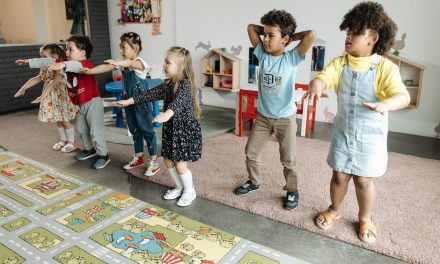Table of Contents
“Bilingual education: Expanding minds, enhancing cognition.”
Introduction
Bilingual education refers to a teaching approach that involves instructing students in two languages, typically their native language and a second language. This educational method has gained significant attention due to its potential impact on cognitive development. Research suggests that bilingual education can have positive effects on various cognitive abilities, such as problem-solving skills, attention control, and executive functions. This introduction aims to explore the impact of bilingual education on cognitive development and shed light on the potential benefits it offers to students.
The Benefits of Bilingual Education on Cognitive Development

Bilingual education has been a topic of interest and debate for many years. While some argue that it may hinder cognitive development, research suggests that bilingual education actually has numerous benefits on cognitive development.
One of the main benefits of bilingual education is its positive impact on executive functions. Executive functions refer to a set of cognitive processes that are responsible for goal-directed behavior, such as problem-solving, decision-making, and attention control. Studies have shown that bilingual individuals tend to have better executive functions compared to monolingual individuals. This is because the constant need to switch between languages and inhibit one language while using the other enhances cognitive flexibility and control.
Furthermore, bilingual education has been found to improve working memory. Working memory is the ability to hold and manipulate information in the mind over short periods of time. Bilingual individuals have been shown to have better working memory compared to monolingual individuals. This is because the constant practice of switching between languages and remembering vocabulary in two languages requires the use of working memory. As a result, bilingual individuals develop stronger working memory skills, which can be beneficial in various academic and professional settings.
In addition to executive functions and working memory, bilingual education has also been linked to enhanced problem-solving skills. Bilingual individuals have been found to be more adept at solving complex problems compared to monolingual individuals. This is because the constant exposure to different linguistic and cultural perspectives in bilingual education fosters a more flexible and creative approach to problem-solving. Bilingual individuals are able to draw on their knowledge and experiences from different languages and cultures, allowing them to think outside the box and come up with innovative solutions.
Moreover, bilingual education has been shown to have a positive impact on attention control. Attention control refers to the ability to focus and sustain attention on a task while ignoring distractions. Bilingual individuals have been found to have better attention control compared to monolingual individuals. This is because the constant need to switch between languages and inhibit one language while using the other requires heightened attention control. Bilingual individuals develop the ability to filter out irrelevant information and maintain focus on the task at hand, which can be advantageous in academic and professional settings that require sustained attention.
Overall, the benefits of bilingual education on cognitive development are numerous. Bilingual individuals tend to have better executive functions, working memory, problem-solving skills, and attention control compared to monolingual individuals. These cognitive advantages can have a significant impact on academic performance, professional success, and overall cognitive functioning. Therefore, it is important to recognize the value of bilingual education and promote its implementation in educational settings.
In conclusion, research suggests that bilingual education has a positive impact on cognitive development. The constant need to switch between languages and inhibit one language while using the other enhances executive functions, working memory, problem-solving skills, and attention control. These cognitive advantages can have long-lasting benefits in various aspects of life. Therefore, it is crucial to support and promote bilingual education as a means to enhance cognitive development and overall cognitive functioning.
How Bilingual Education Enhances Problem-Solving Skills
Bilingual education has been shown to have a significant impact on cognitive development, particularly in enhancing problem-solving skills. Research has consistently demonstrated that individuals who are bilingual have a cognitive advantage over monolingual individuals when it comes to problem-solving tasks. This advantage can be attributed to the unique cognitive processes that bilingual individuals engage in when switching between languages.
One way in which bilingual education enhances problem-solving skills is through the development of cognitive flexibility. Cognitive flexibility refers to the ability to switch between different tasks or mental sets. Bilingual individuals are constantly switching between languages, which requires them to engage in cognitive flexibility. This constant practice of switching between languages strengthens the brain’s ability to adapt and switch between different mental sets, leading to enhanced problem-solving skills.
Furthermore, bilingual education also improves executive function skills, which are crucial for effective problem-solving. Executive function skills include abilities such as attention control, working memory, and inhibitory control. Bilingual individuals have been found to have better executive function skills compared to monolingual individuals. This is because the constant need to monitor and control two languages requires bilingual individuals to develop strong executive function skills. These skills are essential for problem-solving as they enable individuals to focus their attention, hold information in their working memory, and inhibit irrelevant information.
In addition to cognitive flexibility and executive function skills, bilingual education also enhances problem-solving skills through improved metalinguistic awareness. Metalinguistic awareness refers to the ability to think about and reflect on language. Bilingual individuals have a heightened awareness of language structure, grammar, and vocabulary due to their exposure to multiple languages. This metalinguistic awareness allows them to approach problem-solving tasks from different linguistic perspectives, enabling them to think more creatively and flexibly.
Moreover, bilingual education has been found to enhance problem-solving skills by promoting divergent thinking. Divergent thinking is the ability to generate multiple solutions to a problem. Bilingual individuals have been shown to be more proficient in divergent thinking compared to monolingual individuals. This is because the exposure to different languages and cultures broadens their perspective and allows them to think outside the box. Bilingual individuals are more likely to consider alternative solutions and approaches to a problem, leading to more creative and effective problem-solving.
Furthermore, bilingual education also improves problem-solving skills by fostering a growth mindset. A growth mindset is the belief that abilities and intelligence can be developed through effort and practice. Bilingual individuals are constantly faced with the challenge of learning and using two languages, which requires perseverance and effort. This experience of overcoming language barriers and acquiring new skills instills a growth mindset in bilingual individuals. They are more likely to view problems as opportunities for growth and are more motivated to persist in finding solutions.
In conclusion, bilingual education has a profound impact on cognitive development, particularly in enhancing problem-solving skills. The constant practice of switching between languages strengthens cognitive flexibility, while the need to monitor and control two languages improves executive function skills. Bilingual individuals also develop metalinguistic awareness, enabling them to approach problem-solving tasks from different linguistic perspectives. Additionally, bilingual education promotes divergent thinking and fosters a growth mindset, further enhancing problem-solving abilities. These findings highlight the importance of bilingual education in promoting cognitive development and preparing individuals for the challenges of an increasingly globalized world.
The Role of Bilingual Education in Developing Cognitive Flexibility
Bilingual education has been a topic of interest and debate for many years, with researchers and educators alike exploring its impact on various aspects of cognitive development. One area that has received particular attention is the role of bilingual education in developing cognitive flexibility.
Cognitive flexibility refers to the ability to switch between different tasks or mental sets, adapt to new situations, and think creatively. It is a crucial skill that allows individuals to navigate the complexities of our rapidly changing world. Research has shown that bilingual education can have a significant positive impact on cognitive flexibility.
One way in which bilingual education promotes cognitive flexibility is through the constant need to switch between languages. Bilingual individuals are constantly exposed to different linguistic and cultural contexts, which requires them to adapt and adjust their thinking accordingly. This constant mental shifting helps to strengthen the brain’s executive functions, which are responsible for cognitive flexibility.
Studies have consistently shown that bilingual individuals outperform monolinguals on tasks that require cognitive flexibility. For example, a study conducted by Bialystok and Martin in 2004 found that bilingual children performed better than monolingual children on tasks that required them to switch between different rules or mental sets. This suggests that bilingual education can enhance cognitive flexibility from an early age.
Furthermore, research has also shown that bilingual education can have long-term benefits for cognitive flexibility. A study conducted by Costa and colleagues in 2009 found that bilingual older adults performed better than monolingual older adults on tasks that required them to switch between different cognitive processes. This suggests that the cognitive benefits of bilingual education can extend into old age.
The impact of bilingual education on cognitive flexibility is not limited to language-related tasks. Research has shown that bilingual individuals also demonstrate enhanced cognitive flexibility in non-linguistic domains. For example, a study conducted by Bialystok and colleagues in 2006 found that bilingual children performed better than monolingual children on tasks that required them to switch between different visual stimuli. This suggests that the benefits of bilingual education extend beyond language processing and can have a broader impact on cognitive development.
The mechanisms through which bilingual education promotes cognitive flexibility are still being explored. One hypothesis is that the constant need to inhibit one language while using the other enhances the brain’s ability to suppress irrelevant information and focus on relevant information. This enhanced inhibitory control may contribute to improved cognitive flexibility.
In conclusion, bilingual education plays a crucial role in developing cognitive flexibility. The constant need to switch between languages and adapt to different linguistic and cultural contexts strengthens the brain’s executive functions and enhances cognitive flexibility. Research has consistently shown that bilingual individuals outperform monolinguals on tasks that require cognitive flexibility, and these benefits can extend into old age. The impact of bilingual education on cognitive flexibility is not limited to language-related tasks but also extends to non-linguistic domains. Further research is needed to fully understand the mechanisms through which bilingual education promotes cognitive flexibility.
Bilingual Education and its Effect on Memory and Attention Skills
Bilingual education has been a topic of interest and research for many years, as educators and researchers seek to understand its impact on cognitive development. One area that has received particular attention is the effect of bilingual education on memory and attention skills. Numerous studies have been conducted to explore this relationship, and the findings have been both fascinating and enlightening.
One of the key findings from research on bilingual education and memory is that bilingual individuals tend to have better working memory than their monolingual counterparts. Working memory refers to the ability to hold and manipulate information in the mind over short periods of time. This skill is crucial for a wide range of cognitive tasks, such as problem-solving, decision-making, and learning new information. Bilingual individuals have been found to have enhanced working memory capacity, which allows them to process and retain information more efficiently.
Furthermore, bilingual education has also been found to have a positive impact on attention skills. Attention is the ability to focus on relevant information while filtering out distractions. Bilingual individuals have been shown to have better attention control, which allows them to concentrate on tasks and ignore irrelevant stimuli. This enhanced attentional control is believed to be a result of the constant need to switch between languages and inhibit the interference from the non-target language. Bilingual individuals develop a heightened ability to suppress irrelevant information and maintain focus on the task at hand.
The benefits of bilingual education on memory and attention skills are not limited to childhood. Research has shown that these advantages persist into adulthood and can even help delay the onset of cognitive decline in older age. Bilingualism has been found to be a protective factor against age-related cognitive decline, such as Alzheimer’s disease and dementia. The cognitive reserve built through bilingual education, including the enhanced memory and attention skills, is believed to contribute to this protective effect. Bilingual individuals have been found to have a higher threshold for cognitive decline, allowing them to maintain cognitive function for longer periods of time.
It is important to note that the benefits of bilingual education on memory and attention skills are not exclusive to individuals who are fully bilingual. Even individuals who are proficient in a second language, but not fully bilingual, have been found to exhibit similar advantages. This suggests that any exposure to a second language, whether through formal education or immersion, can have a positive impact on cognitive development.
In conclusion, bilingual education has a significant impact on cognitive development, particularly in the areas of memory and attention skills. Bilingual individuals have been found to have better working memory and attention control, which are crucial for various cognitive tasks. These advantages persist into adulthood and can even help delay the onset of cognitive decline in older age. The benefits of bilingual education are not limited to fully bilingual individuals, as even proficiency in a second language can lead to similar advantages. As educators and researchers continue to explore the impact of bilingual education, it becomes increasingly clear that it is a valuable tool for enhancing cognitive development and promoting lifelong cognitive health.
Q&A
1. How does bilingual education impact cognitive development?
Bilingual education has been found to enhance cognitive development by improving problem-solving skills, cognitive flexibility, and executive functions.
2. Does bilingual education improve academic performance?
Research suggests that bilingual education can lead to improved academic performance, including higher test scores and better reading and writing skills.
3. Are there any social benefits of bilingual education?
Bilingual education promotes cultural understanding, empathy, and communication skills, allowing individuals to interact more effectively in diverse social settings.
4. Can bilingual education delay cognitive decline in older adults?
Studies indicate that bilingualism may delay the onset of cognitive decline and reduce the risk of developing age-related neurodegenerative diseases, such as Alzheimer’s.
Conclusion
In conclusion, bilingual education has a positive impact on cognitive development. Research has shown that bilingual individuals tend to have better attention control, cognitive flexibility, and problem-solving skills compared to monolingual individuals. Bilingual education provides opportunities for individuals to develop these cognitive abilities through the constant use and switching between two languages. Additionally, bilingual education has been found to enhance executive functions, such as working memory and inhibitory control. Overall, bilingual education plays a crucial role in promoting cognitive development and should be encouraged in educational settings.




